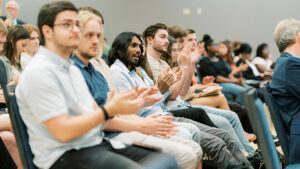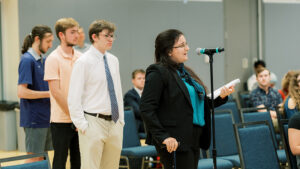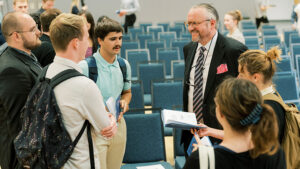
Last month, The Fund for American Studies (TFAS) held the annual Neal B. Freeman All-Student Lecture with featured speaker David Bahnsen, managing partner and chief investment officer of The Bahnsen Group, author and commentator.

For nearly a decade, the Freeman Lecture series has brought in accomplished and engaging speakers to address the principles of a free society, free markets, personal responsibility and virtue. Previous speakers have included: Dr. Samuel Gregg, Johan Norberg, Dr. José Piñera and Lawrence Reed.
TFAS President Roger Ream ’76 opened the presentation by sharing Freeman’s successes and expressing gratitude for his ongoing generosity in supporting TFAS students.
Once poor countries have embraced market reform, liberty, self interest, mutual cooperation, private property and free exchange, they will find themselves richer, their people happier and their futures brighter.” – David Bahnsen
“Neal Freeman is a man of many accomplishments in his career – journalist, entrepreneur, businessman, author, philanthropist and award-winning television producer,” said Ream. “We’re most grateful to Neal for his generous gift that enables us to host this student lecture.”

Bahnsen’s remarks certainly gave students the opportunity to reflect on free markets as they relate to humanity and happiness. Throughout his presentation, he used historical examples to demonstrate which ideas created the optimal outcome when it comes to free markets.
“Once poor countries have embraced market reform, liberty, self interest, mutual cooperation, private property and free exchange, they will find themselves richer, their people happier and their futures brighter,” said Bahnsen. “On the other hand, well resourced countries with bounty and plenty that went the other way saw their debt explode, their standard of living decline and in many of the more extreme cases – their nations implode.”

Bahnsen referenced the 2008 financial crisis to make the case for approaching free-market ideas with human needs in mind as individuals will have to face both the benefits and repercussions of these decisions.
“At the core of these markets are still human beings – human beings with incentives, with consequences, doing economic calculations and living with the results,” he said. “Humans who have needs and wants can only have their needs and wants met by meeting the needs and wants of others.”
Following the lecture, students engaged in a Q&A session where Bahnsen expanded on the difference between free markets and central planning. Students were also given a copy of his book “There’s No Free Lunch: 250 Economic Truths,” which he referred to throughout his lecture.
Watch the full lecture below.

